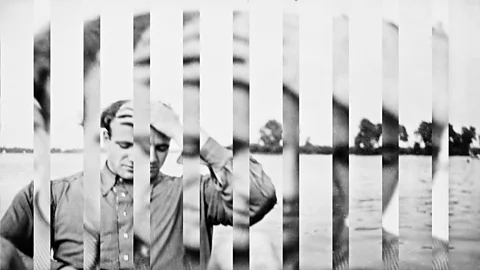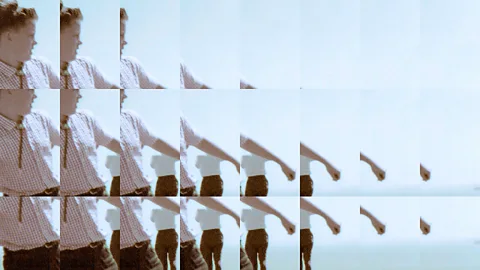11 mind-boggling facts about time
 Edouard Taufenbach and Bastien Portout
Edouard Taufenbach and Bastien PortoutThis week, we're launching a special series called "Time: The Ultimate Guide". To kick things off, here are some of the most fascinating facts we've learnt to date…
To mark the 60th anniversary of Doctor Who, we'll be spending the next week tackling the big questions about time, including the science of time travel, how clocks have shaped humanity, and even the mind-bending temporal consequences of flying into a black hole.
- Read and watch more from Time: The Ultimate Guide.
We're starting our ultimate guide with 11 mind-bending facts about the physics, psychology and history of time, plucked from the BBC Future archive. Read on to learn why there's more to time than meets the eye.
1. YOUR LANGUAGE AFFECTS YOUR PERCEPTION OF TIME
Think of time as a line. Which direction does it flow? Is it horizontal or vertical? Or perhaps it is not a line at all for you. The answers to these questions may very well depend on what language you speak.
Much of the way we perceive the time is influenced by the language we use. For example, English speakers describe time as being in front or behind them, or as a horizontal line moving left to right. Mandarin speakers envision time as a vertical line where down represents the future, while Greek people tend to view time as a three dimensional entity that is "big" or "much" rather than "long". In Pormpuraww, a remote Indigenous Australian community, time is arranged according to east and west.
The language we use to describe the passing of time can also do strange things to the way we think. We can recall attributes that someone is said to have in the present more quickly than those they are said to have had in the past, for example.
Read more: Can language slow down time? and The weird way language affects our sense of time and space.
2. WHEN THE UNIVERSE EVENTUALLY DIES THERE WILL BE NO MORE FUTURE AND NO PAST
Much like us, the way time passes changes will change as the Universe ages. The "arrow of time", which points from the past towards the future, is thought to have its origins in the Big Bang. The infant Universe is thought to have had very low entropy – a measure of disorder or randomness. Since then, entropy has been increasing – this change is what gives the arrow of time its directionality. It's the same reason it's easy to crack a fresh egg, but extremely hard to take a mess of shards and yolk and create a whole fresh egg.
No one knows what will happen at the end of the Universe, but a strong contender is "heat death", where entropy will have reached a maximum and the arrow of time will lose its direction. Think of it as all the eggs in the Universe being already smashed, and after that nothing interesting ever happens again.
Read more: Why does time go forwards, not backwards?
 Edouard Taufenbach and Bastien Portout
Edouard Taufenbach and Bastien Portout3. IT MAY NOT BE POSSIBLE TO HAVE CONSCIOUS EXPERIENCE WITHOUT TIME
We count, therefore we are. The ticking of time is the invisible heartbeat of our lives, and affects every moment of our consciousness. Time and self are in perpetual handshake – even a human trapped in a completely dark cave would still be governed by the circadian rhythms of our internal clocks.
Holly Andersen, who studies the philosophy of science and metaphysics at Simon Fraser University in Burnaby, British Columbia, warns about what losing our sense of time could do to our sense of self. She believes it's not possible to have conscious experience without time and the passage of time. Think about how your personal identity is built over time, filed away as memories.
"These memories constitute you over time," says Andersen. "If you lose a bunch of time you are now a different person."
Read more: How to escape the tyranny of the clock.
4. THERE'S NO SUCH THING AS A CLOCK WITH 100% ACCURACY
Metrologists work very hard to keep time, using ever-finer technology to measure the passing of minutes, seconds and hours. However, while their atomic clocks are incredibly accurate, they're not perfect. In fact, there is no clock on Earth that is entirely "correct".
The actual process of defining what time it is – right now – is based on lots of clocks, all keeping time around the world. National laboratories all send their time-keeping to the International Bureau of Weights and Measures in Paris, which then creates a weighted average. The time, therefore, is a human construct.
Read more: The super-clocks that define what time it is.
 Edouard Taufenbach and Bastien Portout
Edouard Taufenbach and Bastien Portout5. THE EXPERIENCE OF TIME IS ACTIVELY CREATED BY OUR MINDS
Various factors are crucial to our construction of the perception of time – memory, concentration, emotion and the sense we have that time is somehow located in space. Our time perception roots us in our mental reality. Time is not only at the heart of the way we organise life, but the way we experience it.
The upside is that this gives us some measure of control over how we experience it. For example, if you want to feel like your life is not rushing past you, the key is novelty: research shows that a life of repetitive and routine activities will feel, as you reflect on it, that time is moving faster.
Read more: What we get wrong about time.
6. THERE ARE CITIZENS OF THE 22ND CENTURY ALREADY AMONG US – BUT THEY'RE NOT TIME TRAVELLERS
The next century can often feel very far away: a distant land, where hypothetical unborn generations live. However, there are millions of people on Earth right now who will be there when the fireworks go off on New Year's Eve 2099. A child born in 2023 will be their 70s. We're far more connected across long spans of time than we might realise. Through our family ties, we're all just a hop, skip and a jump away from past and future centuries.
7. WE CAN ALL EXPERIENCE A TIME WARP
Time does not always flow at the same rate for everyone. Is time all in the mind?
A car skids for what feels like an age, spraying gravel into the air where it hangs motionless. Time slows almost to a standstill and, in that moment, you react and dive for safety. In situations like this, stress can prompt the brain to speed up its internal processing – to help you handle a life-or-death situation.
Brain disorders such as epilepsy or stroke, too, can cause temporal tricks of the mind – speeding time up or stopping it dead. Some people, like athletes, can even train their brain to create a time warp on demand; a surfer catching a wave at the perfect moment, an unstoppable footballer.
Time, it seems, is a fragile illusion. In a moment we could find ourselves in an altered reality.
Read more: The man who saw time stand still.
8. WHEN THE CLOCKS CHANGE FOR DAYLIGHT SAVINGS, WE HAVE ONE BUILDER TO THANK (OR BLAME)
Changing the clocks for summer – to make the most of long daylight hours at higher latitudes – is not universally embraced by everyone. But love it or hate it, there's a stubborn British campaigner you can thank. Without a builder called William Willett, a quarter of the world – including the US – might never have adopted daylight saving time.
After Willett managed to persuade political leaders, Britain made the change during World War One. The move came about because of a coal shortage – and longer daylight hours meant less need for coal-powered electricity to keep the lights on. It was such an effective idea that in World War Two, Britain took it a step further and temporarily ran on Double Summer Time, a full two hours ahead of GMT, to save on industrial costs.
Read more: The builder who changed how the world keeps time.
9. YOU DON'T ACTUALLY LIVE IN THE PRESENT
As you read these words, it's easy to assume that it's "now". However, it's not.
Take the simple act of looking at a person speaking to you across a table. The confirmation of them moving their lips reaches our eyes before the sound of their voice (because light travels faster than sound) but our brain syncs them up to make them match.
And that's not even the weirdest thing about time. The laws of physics suggest that in some cases, it can also flow backwards. Philosopher Katie Robertson explains the dizzying implications of all this in the video below:
10. OUR DAYS ARE GETTING LONGER DUE TO THE MOON'S GRAVITY
It might surprise you to know that the Moon – our planet's constant orbital companion in the astro-ballet we perform around the Sun – is inching away from us. Every year the distance between the Earth and the Moon increases by 1.5in (3.8cm). And as it does so, it is making our days ever so slightly longer in the process.
This is down to the tug of the Moon's gravity on our planet. The gravitational pull of the Moon creates tides, which are a "bulge" of water that extends in an elliptical shape both towards and away from the gravity of the Moon. But the Earth spins on its axis much faster than the Moon orbits above, meaning friction from the ocean basins drag the water along with them. This causes the bulge to move slightly ahead of the Moon in its orbit, which in turn attempts to pull it backwards. This gradually saps our planet's rotational energy, slowing its spin while the Moon gains energy, causing it to move into a higher orbit and away from the Earth.
The incremental braking of our planet's spin has caused the length of an average Earth day to increase by about 1.09 milliseconds per century since the late 1600s. Other estimates put the figure a little higher, at 1.78ms per century by drawing on more ancient observations of eclipses. While none of this sounds like much, over the course of the Earth's 4.5-billion-year history, it adds up.
Read more: How the Moon is making days longer on Earth.
11. MANY PEOPLE LIVE OUTSIDE CONVENTIONAL TIME – FOR THEM, IT'S NOT 2023
For many Nepalis, this article was not published in 2023. In the Nepali Bikram Sambat calendar, it's actually the year 2080. At least four calendars are used among different ethnic groups there, and Nepal is even 15 minutes out of sync with standard time zones.
It turns out many cultures are fine with experiencing multiple years simultaneously. In Myanmar, it's also 1384, in Thailand it's 2566, and in Ethiopia it's 2016, where the year lasts 13 months. The Islamic calendar, meanwhile, marked the arrival of the year 1445 in July.
Read more: The people who live in multiple timelines.
--
If you liked this story, sign up for The Essential List newsletter – a handpicked selection of features, videos and can't-miss news delivered to your inbox every Friday.
